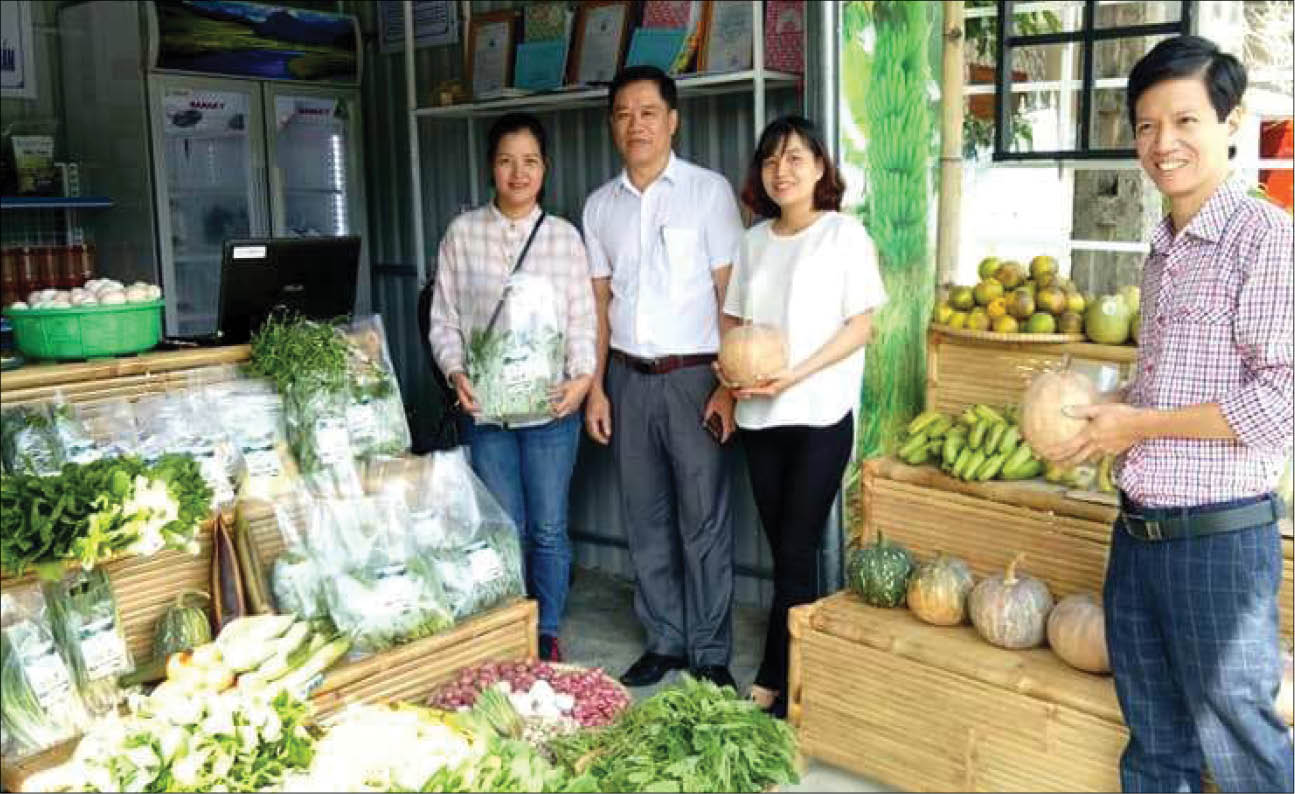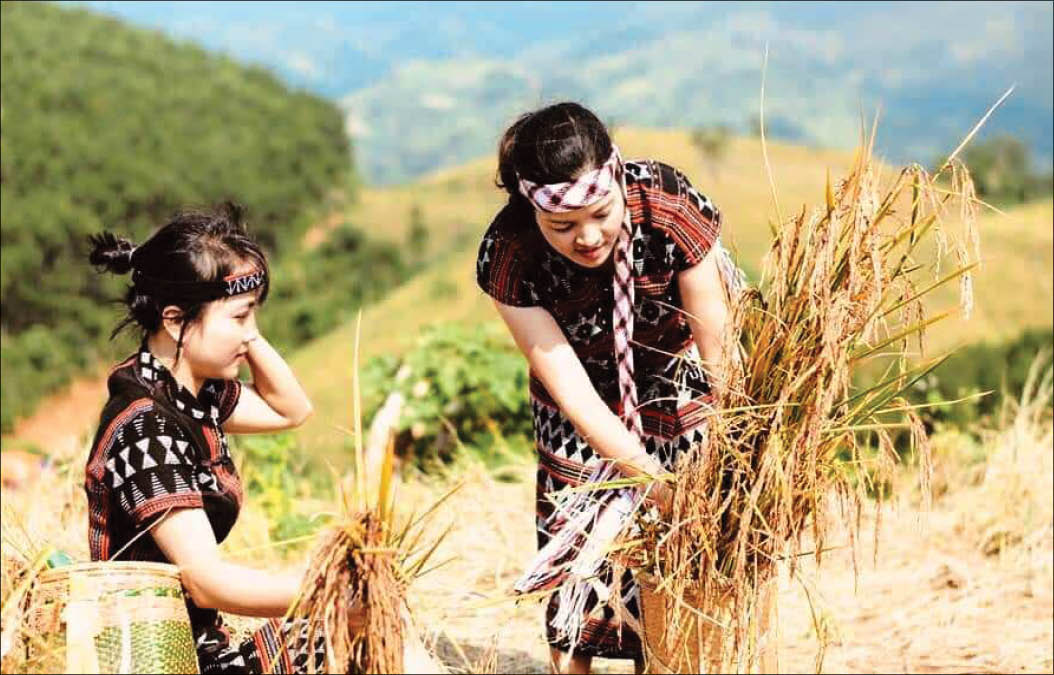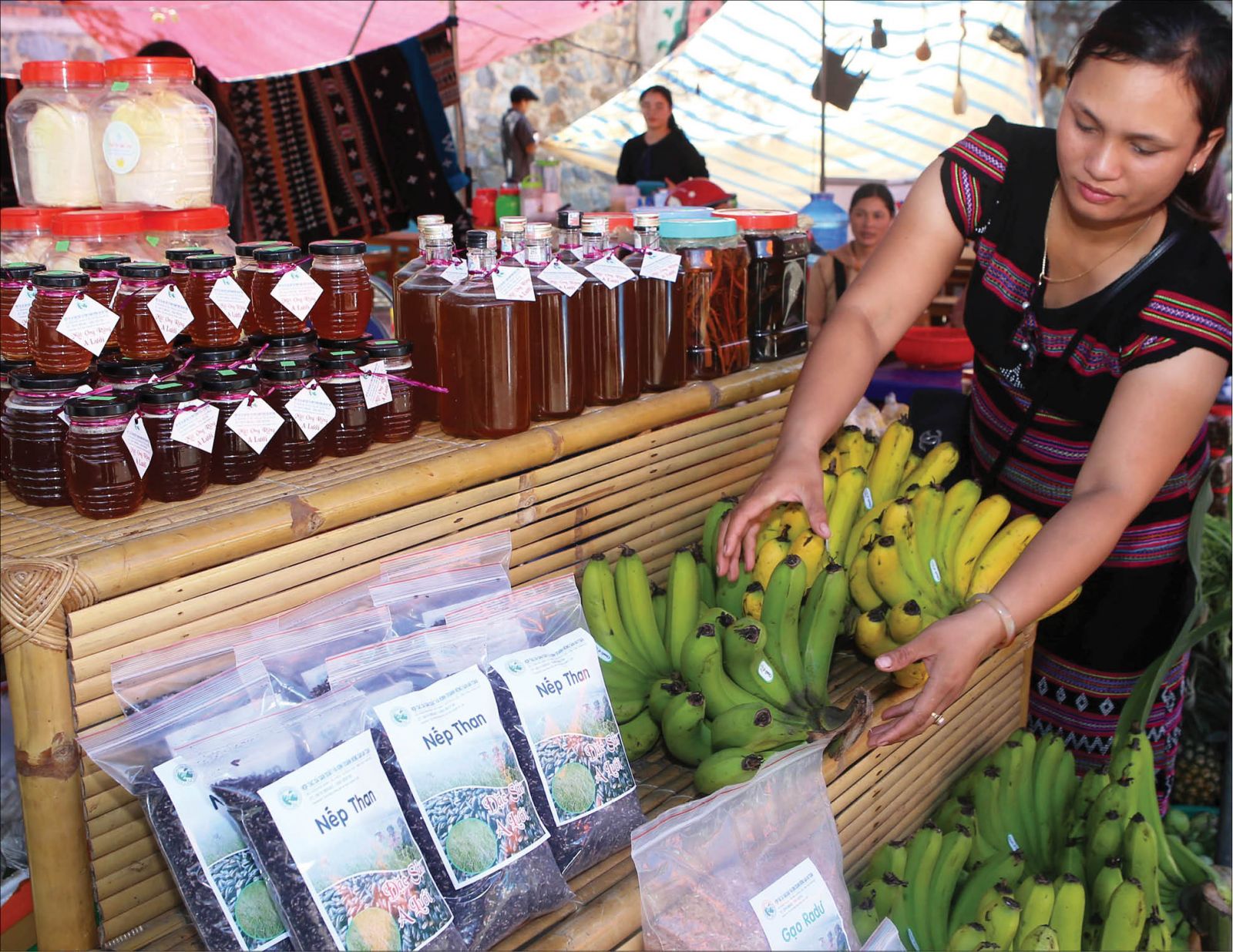
A Luoi agricultural products are increasingly gaining a foothold in the market. Photo: L.THO
Commerce in the 4.0 era
Those who travel to this mountainous region will witness a new fresh color. People are beginning to talk about the change of the "Mountainous Town" on the foundation of very old things.
I begin this story with the banana, which is a not strange product in the highlands. In many people's minds, on simple stalls along Ho Chi Minh Road, this fruit is a simple commodity of the ethnic minorities. A few stems of bananas along the road with dirt cheap price did not bring high income to the local people. However, A Luoi’s old dwarf banana is now famous, becoming a crop to reduce poverty.
In a visit to the old dwarf banana garden together with Mr. Nguyen Van Cho, Vice Chairman of the People's Committee of Hong Bac commune, he pointed his hand to the green, vast area, saying: "This is a kind of plant that eradicates poverty and is a highland specialty. Bananas are no longer cheap but bring great value, at VND5.000/kg when purchased at the garden. A lot of gardens became a banana plantation area.”
Mr. Cho did not exaggerate. This product is now available on the shelves of 20 Big C supermarkets in the Central and Southern regions, with a price of over VND 10,000/kg. This is proof of the resilience of upland agricultural products, which many delta regions cannot compete with. The Department of Agriculture and Rural Development (DARD) in A Luoi district is implementing new methods of planting bananas, applying scientific and technical advances such as tissue culture to improve product quality.
It is no coincidence that the A Luoi agricultural shops in the city are able to survive and thrive among the available agricultural products in the open market mechanism.
"Our products are real with guaranteed quality. We do not deceive customers. So, once they have tried our products, they will be assured and will repurchase. The ethnic minority people have a habit of planting trees or raising animals without using chemicals, so the products are clean,” said Ms. Le Thi Kim Thoa, manager of A Luoi specialty product store.
From a simple beginning with roadside agricultural stalls, I figure that not many upland people could imagine their rice being packed and labeled, or their fruits and vegetables being transported to the city center for consumption. Perhaps few people could envision that their chicken and egg production would be certified as a food safety supply chain.
Now, they have achieved these visions. The gardens are "planned" to build branded products. From the traditional production mindset, the market economy habits have crept into each village.
At booths of festivals and events, agricultural products and highland specialties are always presented and introduced, escaping from the cycle of "exchanging vegetables to get fish". It was the old habit of the barter system that made the local people standstill; and making an income for them was too challenging. Now, they can sell whatever product they have, even at high prices.

Black sticky rice is a specialty of highland A Luoi. Photo: K.T
"It is heard that there are many people in the plain regions who now like highland products. My vegetables and fruits are introduced online and on Facebook by the district staff and are displayed at festivals. So, many people have asked to buy my products. We have not changed our way of farming, but the district staff has instructed us more about the farming process and the harvest season. And now, we no longer exchange vegetables for rice or Zeng for cows and buffaloes. We now exchange our products for money. Just post the product on Facebook and surely someone will ask to buy it,” said Ms. Ho Thi Phuong (Nham commune, A Luoi district).
An old bottle with new wine
In order to identify the mountainous area at this time, many people will no longer think about misery and poverty. Instead, they will think of the image of a small "street corner" in the depth of green forest, of the flower paths going to the mountain, or of the beautiful waterfalls in the forest. Fruit trees and streams and rivers remain unchanged, only the highland people are increasingly becoming more adaptable i.e., simply changing customs. People "pick" money from wild streams in the magnificent primeval forest.
Secretary of A Luoi District Party Committee, Ms. Nguyen Thi Suu said that people are gradually taking advantage of their existing products and turning them into specialties. With their new way of thinking, they have awaken the seemingly arid land.
Tourists now come to the village not to find a river or stream, but to experience the highland’s way of life and to enjoy specialties, sightseeing, and to relax at homestays.
“The local people are the ones carrying out tourism services, especially community tourism. A Luoi is developing this model and has shown effectiveness. The locality has a lot of potentials for tourism. The fact that many homestays in Hong Ha, Hong Kim and A Roang communes attract hundreds of domestic and international visitors every month is a proof. This contributes greatly to changing the image of the upland area,” said Ms. Le Thi Them, Head of A Luoi district's Culture and Information Department.

A Luoi old dwarf banana has entered supermarkets. Photo: L. THO
A Luoi has many new ideas, even growing vegetables and flowers can become a tourism product. The young people will be familiar with Mrs. Nga's vegetable garden, Mr. Te’s flower garden, and Mr. Chien’s flower garden in the residential quarters 1, and 2 of A Luoi town because these are check-in places that many people have fallen in love with.
Going towards the mountain, amidst a deep blue color, the appearance of the "Mountainous Town" on the legendary Ho Chi Minh Road is gradually changing. There still remain the festive seasons with people who have deep love for the mountains, but the land of Ma Oi pass, A Bia hill, A So airport... now has a new look with a desire to reach new heights.
By LE THO
